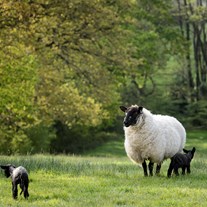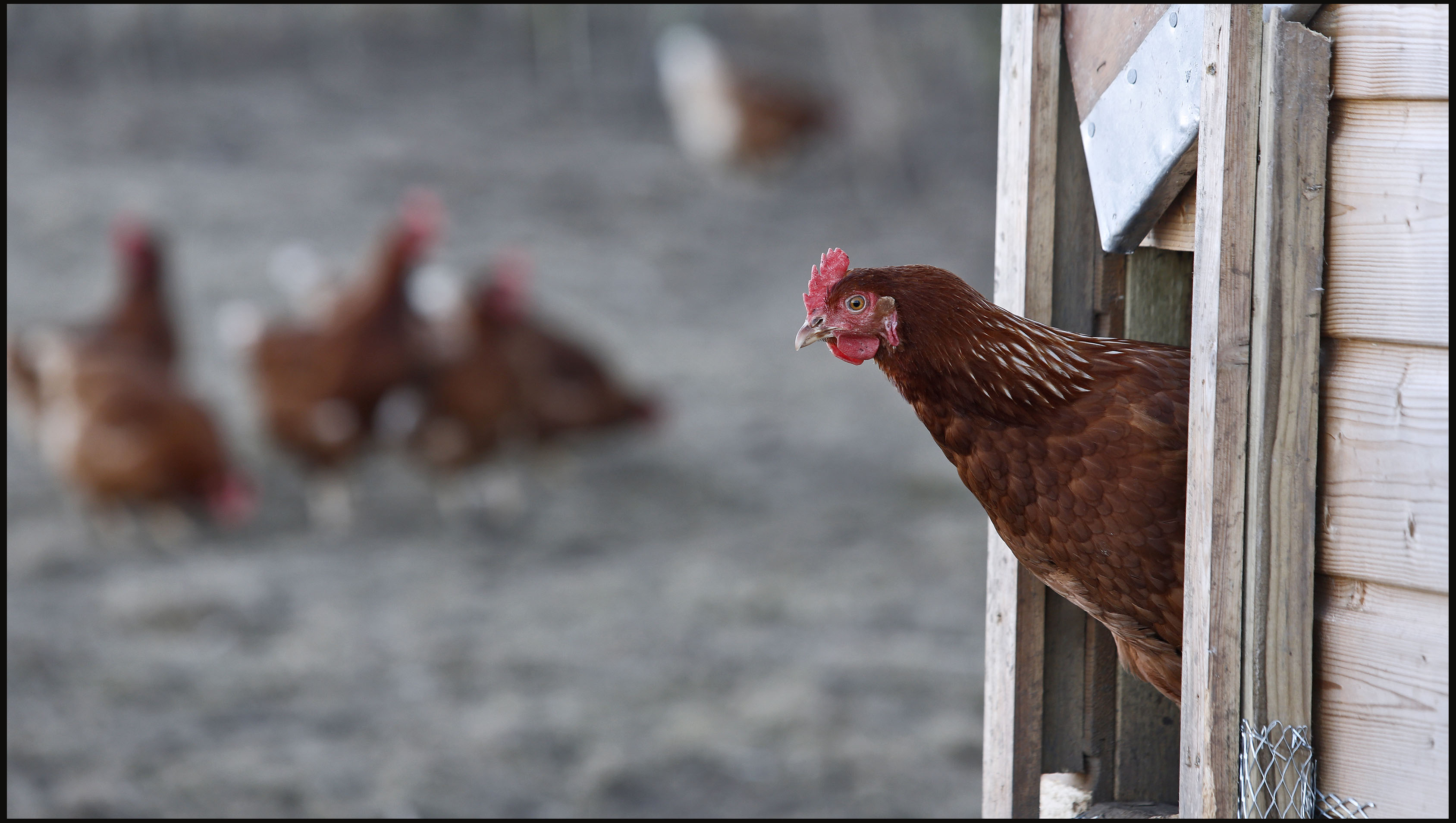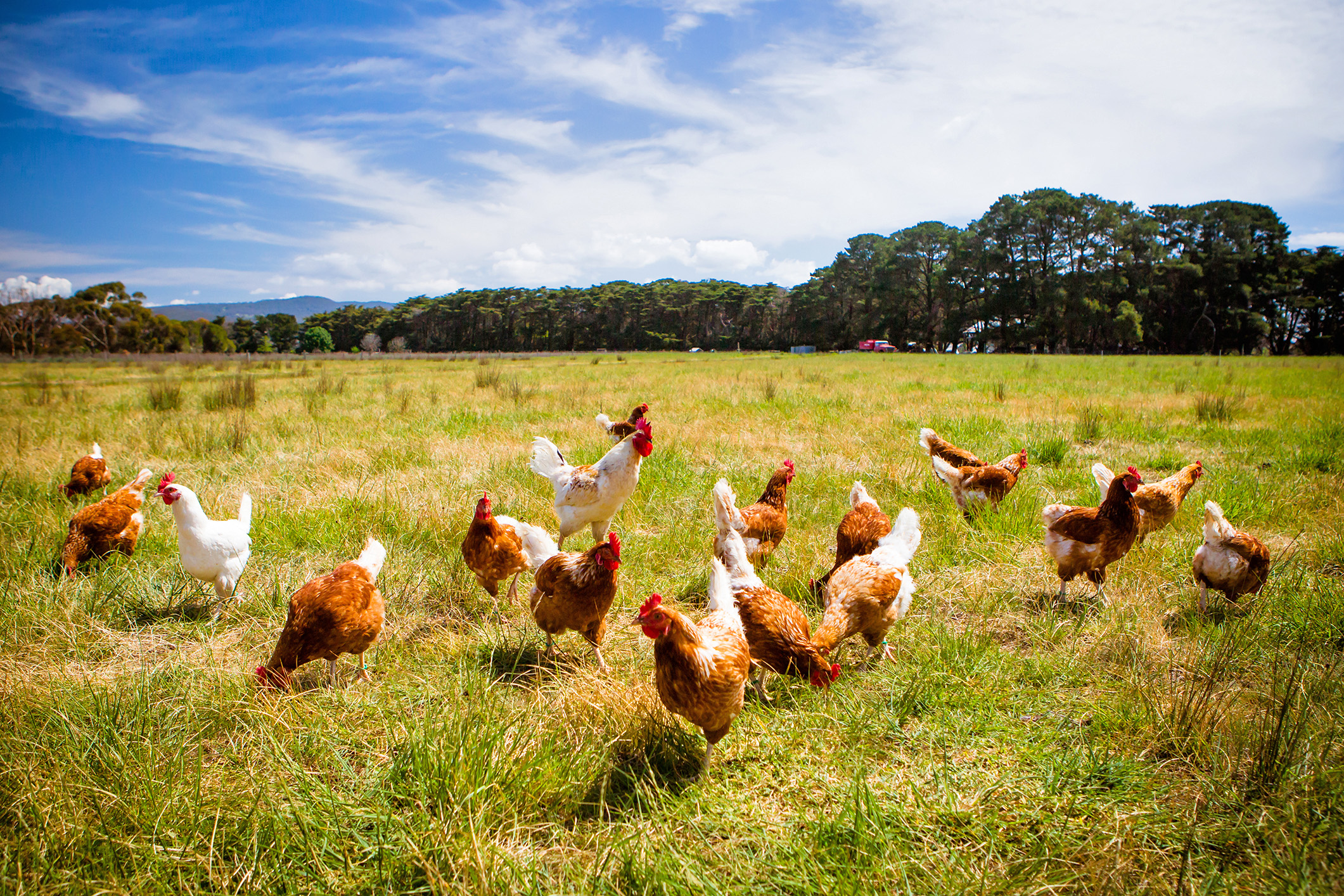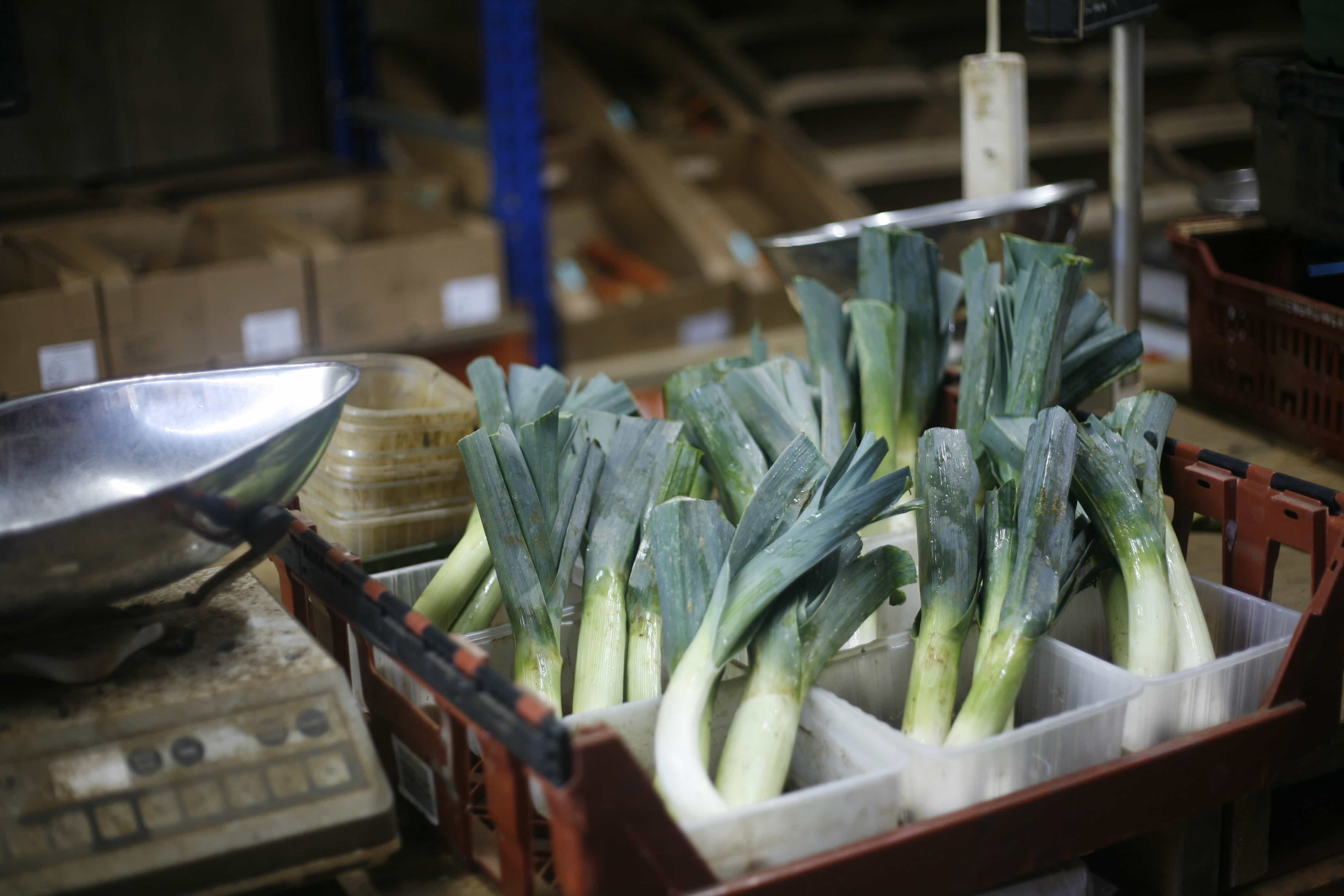
- Soil Association
- Take action
- Organic living
- Why organic?
- Better for animals

Better for animals
Animal welfare is one of the most important aspects of organic farming.
Did you know that the Soil Association has the highest standards for animal welfare of any farming system in the UK?
These standards insist that animals are given plenty of space and fresh air, and are raised in conditions that suit their natural behaviour. As well as requiring that animals are genuinely free-range, the organic standards also cover living conditions, food quality, the use of antibiotics, and transport and slaughter.
Read on to learn more about our general organic welfare standards, or learn about specific standards for:
- Standards for chicken and eggs
- Standards for cows
- Standards for pigs
- Standards for sheep
- Standards for fish and aquaculture
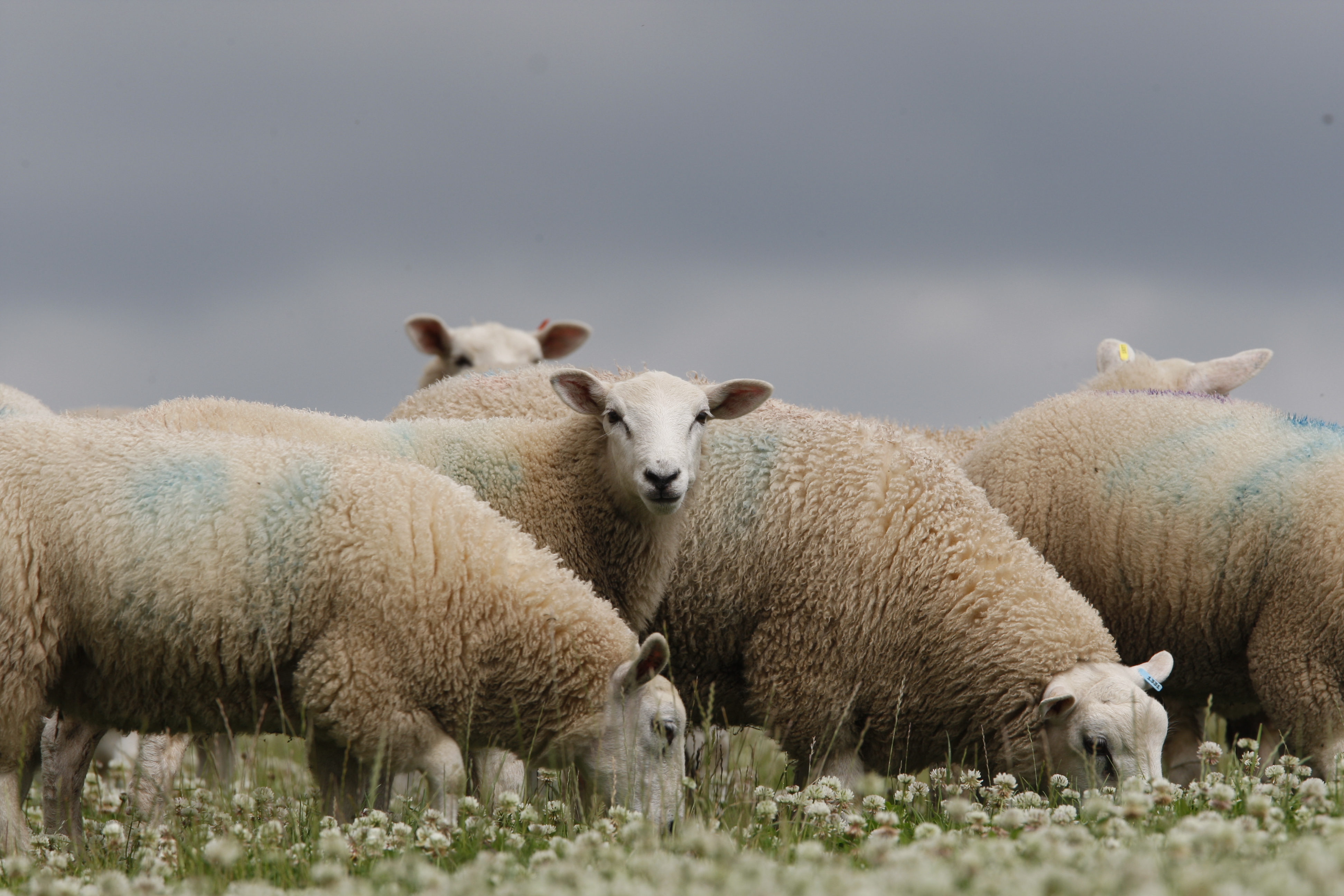
Organic standards mean that animals on organic farms:
- Must have access to pasture (when weather and ground conditions permit) and are truly free range, and must have plenty of space (indoors and outdoors). Farmers must always provide enough light, space and comfort to allow farm animals to move and express their natural behaviours. This helps to reduce stress and disease.
- Are fed a diet that is as natural as possible and free from genetically modified organisms (GMOs). Over a million tonnes of GM crops are imported each year to feed the majority of non-organic livestock which produce chicken, eggs, pork, bacon, milk, cheese etc. This practice is banned under organic standards. Find out how reducing imported feed can have a positive impact on the environment.
- Graze and forage naturally on organic pasture (grasses and other crops) where only natural fertilisers are used and pesticides are severely restricted. Instead of manufactured chemical fertilisers, clover is used in organic farming to fix nitrogen so that crops and grass grow. Organic grazing animals therefore have a diet containing high levels of clover, which is linked to nutritional differences in Omega 3.
- Must not routinely be given antibiotics. Organic farming standards ban the routine use of all antibiotics and wormers; an animal is only treated with medicine if it is sick. In 2017, farm animals accounted for around 30% of all antibiotics used in the UK. Reducing routine antibiotic use helps minimise antimicrobial resistance and protects the effectiveness of these treatments.
By providing the space and environments that animals need, organic farmers can reduce stress and disease (and their consequent side effects) on their farms. This means that animals don’t need to undergo painful mutilations (like beak trimming and tail docking), and it means that there is no need for preventative antibiotics.
Organic chickens and eggs:
Organic chickens are much more than free-range –
- They live in smaller flocks – more than five times smaller than permitted in free-range systems – this is because the health of individual birds can be much more easily managed within a smaller flock.
- Organic poultry must have continuous and easy daytime access to a diverse outdoor range – farmers must provide more pop holes from the hen-house than free-range farms do too, to encourage them to explore the range.
- Chickens must not have their beaks trimmed. In non-organic systems, this is often done to prevent feather pecking, which arises as a symptom of stress from overcrowding.
- Chickens must be given plenty of opportunities to express their natural behaviours, such as foraging, dust bathing and pecking at insects on a natural range.
- Organic standards encourage poultry breeds that are slower growing, and more robust – organic poultry chickens live twice as long as most intensively farmed chickens bred for meat.
Learn more about the differences between free-range and organic eggs.
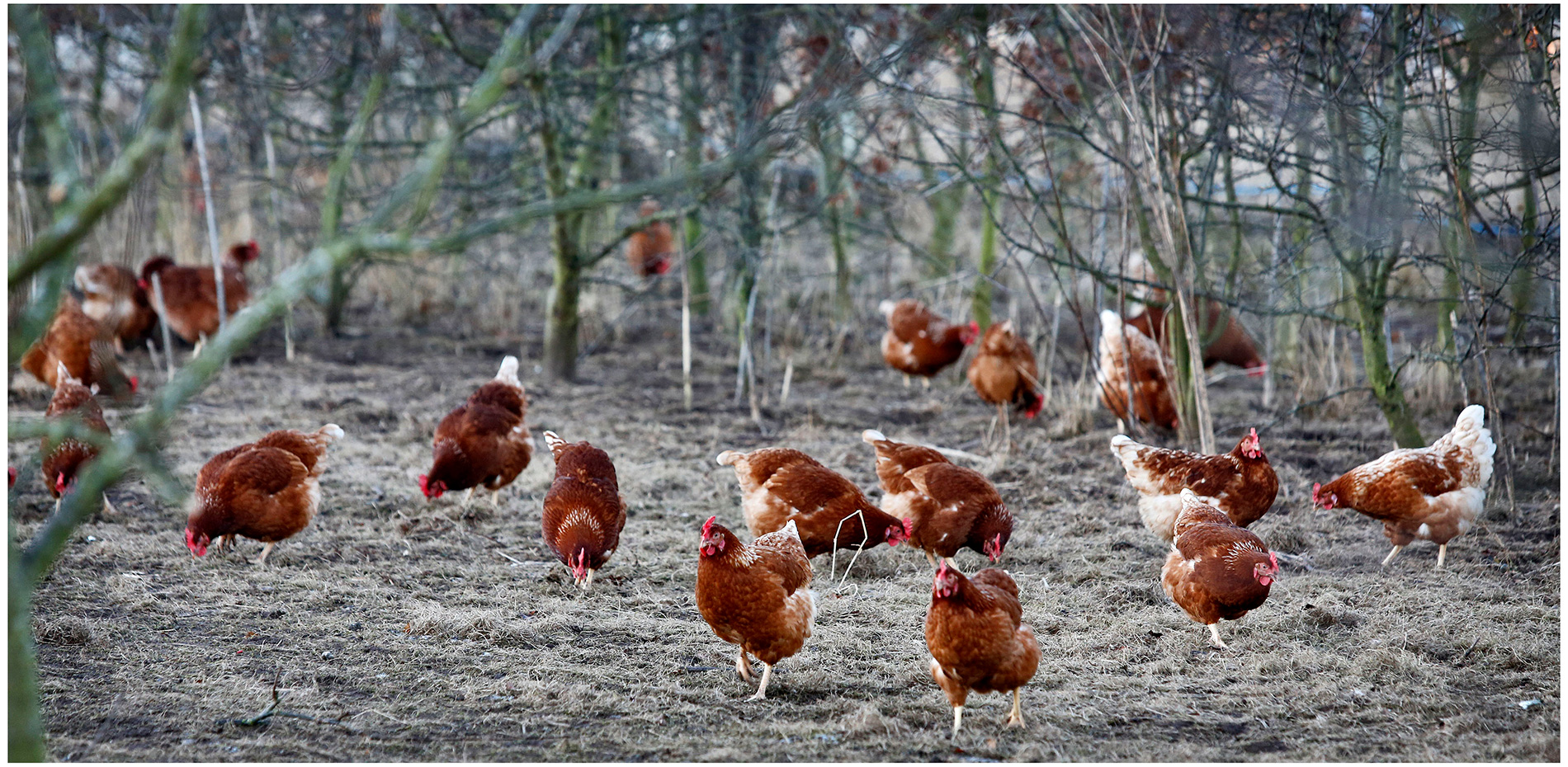
Organic cows:
Unlike many other farming systems, organic cows spend much of their lives outdoors where they can graze naturally on a diet of grass and clover.
- By law, cows must be at pasture whenever conditions allow, over 200 days on average – ‘Zero-grazing’, where cows are kept indoors and fed cut grass or other feeds like soya, is banned under organic standards.
- When they must go indoors because of bad weather, all cows must be housed in well-bedded, spacious yards.
- Organic cows eat mainly grass – organic standards require a minimum of 60% forage in their diets.
- As organic dairy cows are not given the same concentrated feed as many non-organic cows, they tend to have a lower, but more sustainable milk yield, which helps protect their health and welfare.

Organic pigs:
Organic pigs are kept in conditions that, as far as possible, allow them to express their natural behaviour. In practice, this means being kept in family groups with free access to fields. Most organic pigs will be outdoors all year round, though indoor housing is permitted in severe weather conditions, provided that there is plenty of straw bedding for the pigs, and continued access to an outdoor run.
There are a number of common practices in the non-organic pig industry that are banned under Soil Association organic standards. These include:
- Painful mutilations - Pigs raised to organic standards do not have their tails docked (cut short), teeth cut or have painful nose rings fitted. Approximately 80% of UK pigs have their tails cut off to prevent bored and unhappy pigs shut up in sheds from biting the tails of the pigs they are confined with.
- Farrowing crates - these are small metal cage only inches wider than the female pig, which are used around the time she gives birth to restrict her movement and prevent her from following maternal instincts. Around 55% of sows in the UK give birth while confined in crates, where they remain until their litter is weaned. This prevents them from turning around and hampers their ability to perform natural maternal behaviour. A significant proportion of pigs in the UK are still reared on slatted systems, without bedding at all.
- Early weaning - Pigs reared in organic systems are weaned much later than non-organic pigs, at 40 days rather than as early as 21 days. This allows the piglets to develop at a natural pace, reducing stress, disease and antibiotics.
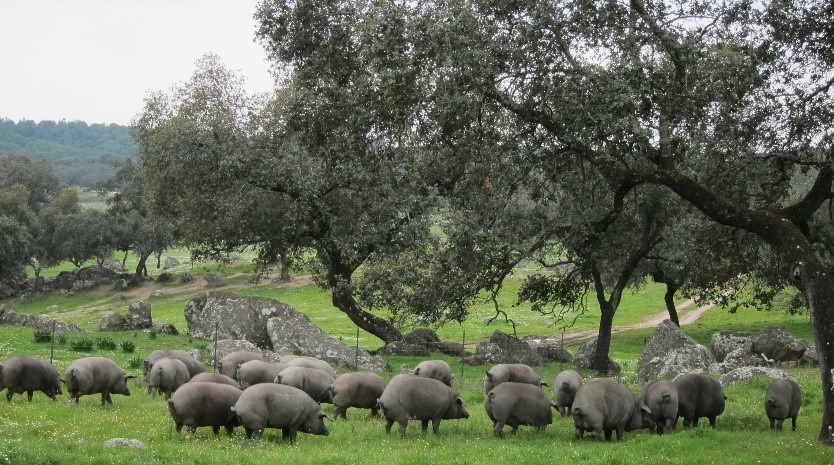
Organic sheep:
The big difference between organic and non-organic sheep farming are the methods used to prevent diseases. For example, on non-organic farms, lambs could be wormed preventatively every four to six weeks. Organic farmers however, are banned from the routine use of antibiotics and wormers, and must instead manage their flocks carefully to reduce disease risk to new-born lambs, and use clean grazing systems to minimise the need for worming:
- Clean grazing involves managing pastures so that sheep, and particularly lambs, are only put into fields that have very low or no worm infestation. If worming is necessary certain treatments can be used, provided the farmer gets approval from a vet and permission from Soil Association before using the treatment.
- Many non-organic farmers also use organophosphorus dips to control sheep scab, which are banned under the Soil Association's rules. Double-fencing can help to prevent sheep scab, which spreads when infected sheep rub on fences dividing them from healthy ones, whilst maintaining a closed flock (no brought-in stock) can also prevent disease.

Organic fish and aquaculture:
It is important that the organic principles of health, ecology, fairness and care are applied to fish and shellfish farming, as well as to animals on land. A diverse range of aquatic species are produced in line with organic principles including many different fish species, seaweed and bivalves (mussels, oysters and clams).
The Soil Association was one of the very first organisations to develop organic aquaculture standards for aquatic animal welfare, water quality and human health. Since first published in 2002, many of our aquaculture standards are now enshrined in European law.
These standards include:
- More space to shoal - Organic salmon standards require fish to be provided with more space than non-organic fish production - this means fewer fish in each enclosure. Lower stocking densities reduce stress and the risk of disease and parasites, like sea lice.
- Treatment of disease - Soil Association’s Aquaculture standards place restrictions on the number of treatments that can be used, and the use of treatments with detrimental effects on the environment. This acts as a strong incentive for salmon farmers to select sites where the challenge from sea lice is lowest, and to manage farms in a way that avoids infection.
- High welfare throughout life cycle, from birth to slaughter - Farmed fish are currently not covered by regulation protecting animals at the time of killing (EC No 1099/2009), yet they are as sensitive to pain as any other terrestrial, farmed species. Soil Association certified fish farms are therefore required to follow recommendations of the Farm Animal Welfare Committee’s ‘Opinion on the Welfare of Farmed Fish at the Time of Killing’. The guidelines identify practices which must be avoided or managed carefully to minimise stress.
- An organic and natural diet - feed for carnivorous aquaculture species must come from trimmings of sustainable fish already caught for human consumption, from organic plant or animal-derived feed materials, or from products derived from whole fish, caught in fisheries certified as sustainable.
Note: Soil Association also prohibit certified businesses from using calcified seaweed, lithothamne (coral strands), or maerl (algae) in feeds, in order to protect these sensitive habitats.
Find out how we are seeking to further improve our organic salmon standards.
Ensuring that animals reared for meat and animal products have a good life is at the heart of the Soil Association’s organic standards.
Treating livestock ethically and meeting their species-specific needs, both physiological and behavioural, is one of the key principles of organic food production, and certification offers assurance that when you see the organic symbol, this meat has been produced to a standard you can trust.
-
Climate-friendly meat
Meat and climate change are regularly in the headlines. But is all meat bad for the planet? Or is climate-friendly meat possible?
Find out more about meat and climate change